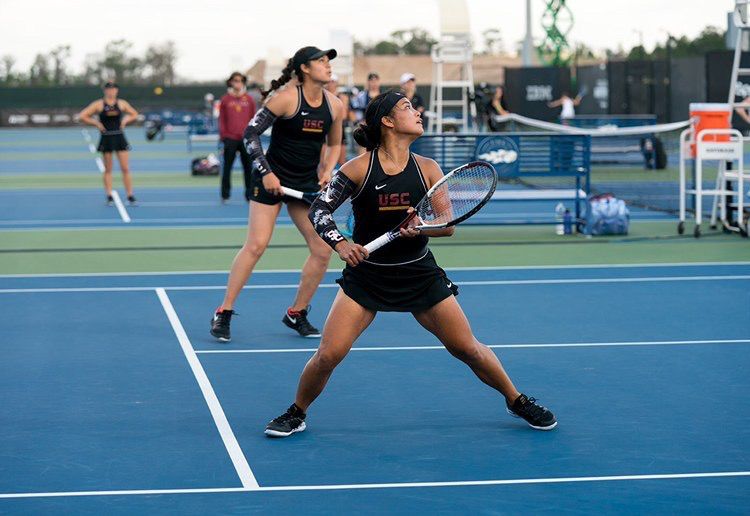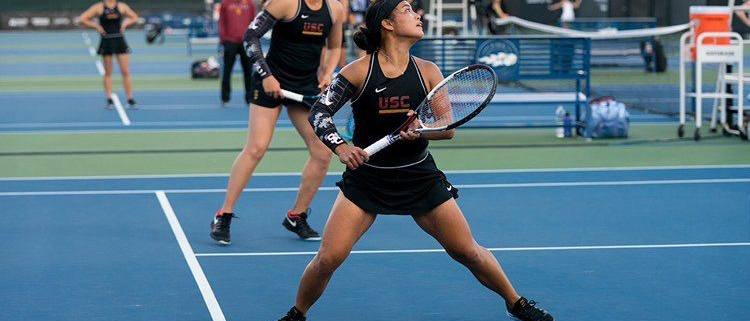Pilipina Trojans strive to increase representation

Sports are deeply ingrained in Pilipinx culture. Basketball courts and makeshift hoops are spotted all over the Philippines and match days for Pilipinx boxers are treated like national holidays.
But despite the deep love Pilipinos have for sports, they are not widely represented in sports media internationally. As Pilipinx American History Month has come to a close, four Pilipina USC athletes reflected on how they strive to increase representation.
Sophomore Eryn Cayetano and fifth-year senior graduate Angela Kulikov’s paths crossed well before their time as doubles partners for the USC women’s tennis team. By the time Cayetano was 7 and Kulikov was 10, both were picked up by the United States Tennis Association, the national governing body for tennis, and its Player Development program, which funnels the next generation of U.S. tennis stars through to the big leagues. Since then, Angela started calling Eryn her “mini me.” Recognizing that there are not many Pilipinx Americans playing tennis, Eryn considers Angela to be her role model.
For fifth-year senior graduate golfer Allisen Corpuz, as a Pilipina Korean, she found herself looking up to women that looked like her since her childhood. She was especially inspired by Jennifer Rosales, a Pilipina professional golfer and former Trojan currently playing on the LPGA Tour.
“My dad was a big fan of her,” Corpuz said. “Then I became a big fan of her, just because she’s Filipina, growing up. And same thing for the Korean golfers — Inbee Park and Se-ri Pak.”
As the first Pilipina Hawaiian on the USC women’s soccer team, the lack of Pilipinx representation particularly in soccer pushes freshman defender Anuhea Kane to work hard and excel.
“It just motivates me more to want to make something of myself further down the line for a Filipino Hawaiian,” Kane said. “It’s so hard to find that connection around the world.”
Corpuz wants to follow in the footsteps of Pilipinx athletes like Rosales to provide another role model for the Pilipinx community — and USC has always been where she wanted to do that. With Corpuz’s dad receiving two degrees from USC, his love for the school passed down to Allisen.
“I’ve learned so much, and I’ve met so many great people,” Corpuz said. “I definitely feel like I’m a much better player than I was coming onto campus. Overall, it’s been a period of a lot of growth for me, and I’ve just had such a fun time at USC.”
With the highs, unfortunately, trials inevitably come along the way. Just last week, Kane tore her ACL during training. While extremely grateful for the opportunities and support being on the women’s soccer team has given her, her time as a student-athlete has been “a roller coaster” thus far. Coming in as an early enrollee last spring, adjusting to crazy schedules and her recent injury have posed significant challenges.
Kulikov felt this pressure placed on student-athletes as well. When she committed to USC, the women’s tennis team was ranked No. 1 in the country. As she began her time as a Trojan, she found herself in the middle of the program’s rebuilding phase.
“I felt this pressure that if I got here when things kind of fell apart, I need to be a reason that we at least started heading back in the direction of restoring this legacy that USC women’s tennis is meant to be,” Kulikov said.
With these challenges that student-athletes face in addition to the lack of Pilipinos in sports, these Pilipina Trojan athletes sought out a supportive community beyond the athletics realm. Last semester, both Kane and Cayetano joined USC Troy Philippines — the University’s only Pilipinx club.
“I knew I needed Troy Phi because the athletic world is so different, it’s so hard for people that aren’t involved with it to understand it,” Kane said. “Our schedules are crazy … but I still wanted to enjoy the Troy Phi events. Thursday night was Troy Phi, but Friday morning was training. But I still made it work because I need to balance my life.”
Cayetano spoke similarly of her experience with Troy Phi.
“It was definitely tough for me because I grew up in Long Beach, Calif., which is a very diverse area and I grew up with a lot of Filipinos,” Cayetano said. “The Filipino culture is very strong with their values, culture and this idea of a community. It was tough to find that in the athletic world … so I joined Troy Phi to feel that community again.”
By seeking out a support system outside of their sports teams, these Trojan athletes saw the roles of their sports and Pilipinx communities as separate. However, they were also able to clearly see how their identities as a Pilipina and as an athlete intersect. For all of them, they hold specific Pilipinx values close to heart and carry their culture by living them out.
“Loyalty has always been a huge thing for me. Consideration for others before consideration for yourself has always just been driven into me,” Kulikov said. “I never really knew where these came from. So it really wasn’t until I got to engage with other Filipinos that I started to see. Oh, they have it too! No wonder! It’s a Filipino value.”
Corpuz said that her Pilipinx and Korean cultures help keep her grounded.

Fifth-year senior graduate golfer Allisen Corpuz said she was inspired from an early age by seeing Asian golfers on the professional stage. |
Photo courtesy of USC Athletics
“I think all Asian communities are a little different because there is … that sense of community and really connecting with others and giving back. Not that that’s not an American value, but I feel like it’s very much emphasized in Filipino and Korean culture as well,” Corpuz said. “It’s helped me to be a lot more balanced — just not taking golf too seriously and just knowing that at the end of the day, I still have my family and I still have my friends.”
Though similar in their shared Pilipinx culture, Kulikov, Kane, Corpuz and Cayetano have all had unique journeys to where they are now as student-athletes. However, as they all aspire to play at the professional level in the future, they are united in wanting to use their platforms to create positive change.
Kulikov sees a much bigger purpose to sports aside from entertainment. In addition to wanting to change the narratives and break down harmful stereotypes surrounding female athletes, she also feels a natural call to advocate for the destigmatization of mental health as an applied psychology major.
As a defender standing at 5 feet tall, Kane wants to show Pilipinx Hawaiian athletes that seemingly disadvantageous physical traits will not hinder them from reaching their dreams. She wants to share the message that through hard work and determination, she was able to reach her full potential.
With the presence of Asian women golfers on the professional circuit inspiring Corpuz from an early age, she believes in the power of representation.
“It makes it easier to visualize yourself in that position if they look like you,” Corpuz said. “There’s so many girls out there that might not even realize it is something they want, so I definitely just want to be a role model, whether it’s on or off the course.”
Just like how Kulikov has been a mentor and role model to her, Cayetano hopes to do the same as she is already striving to build relationships with young Pilipinx tennis players today. In April, Cayetano spent her time in quarantine stringing and donating tennis rackets and supplies to young athletes in the Philippines who lacked sufficient equipment.
With her platform, she hopes to increase the representation of Pilipinos in the sports world for the next generation of Pilipinx athletes to look up to and to uplift the Pilipinx community and provide a sense of pride.
“As long as I’m able to touch the lives of some, I hope it touches the lives of many in the future,” Cayetano said.
Disclaimer: Johannah Suegay is a director of media for Troy Philippines.

